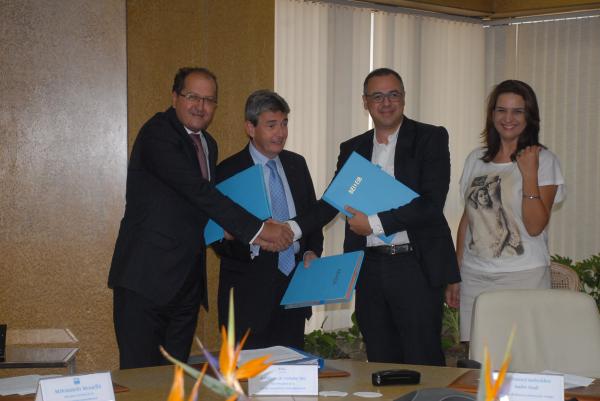
At a time when the Ministerial Conference on investment in Tunisia is being held, the European Investment Bank (EIB) has mobilised its resources more than ever to support Tunisians in their process of economic transition. Since the democratic uprising in January 2011, capitalising on its expertise and experience in the Mediterranean region, the EIB has invested more than EUR 1bn in Tunisia, in support of projects in such varied areas as energy, small and medium-sized enterprises (SMEs), urban and transport infrastructure, education, social housing and even micro-credit. This year alone, more than EUR 500m has been invested in Tunisia, thus confirming the major role played by the EIB in Tunisia as the leading international financier of the transition.
"It is essential to support Tunisia's economic transition by means of innovative, sustainable investment", said EIB Vice-President Philippe de Fontaine Vive. "And this means that all Tunisia's economic partners must be fully mobilised. The reforms initiated will establish a shared prosperity that will create jobs. The younger generations' future depends on this!"
Backed by its 2014-2020 mandate, the EIB will focus increasingly on financing socioeconomic infrastructure and the private sector in Tunisia.
Supporting the energy sector and businesses operating in Tunisia: new EUR 230m financing operation for the "Nawara" concession
Aware of the importance of the energy sector in Tunisia's sustainable economic development, the EIB has today (Monday 8 September) signed a EUR 230m financing agreement with the Austrian company OMV to operate the "Nawara" concession in the south of the country. This loan follows on from the EIB's first financing operation for this project, which amounted to EUR 150m and was signed with ETAP in March of this year.
This large-scale project is of national importance for Tunisia. It will involve the construction of a 370 km gas pipeline from Nawara to Gabès, a production plant in Nawara and a gas-processing plant in Gabès, providing the Tunisian economy with a new lifeline insofar as energy is concerned. The new infrastructure to be financed will therefore enable existing reserves to be further exploited and the local market to be supplied with natural gas, while encouraging other initiatives in the exploration for hydrocarbons.
"The signing of this loan provides a very positive signal for investment in Tunisia and is highly symbolic for the Euro-Mediterranean partnership", stated Mr de Fontaine Vive at the signing ceremony. "By supporting projects of this kind we are acting for the future, for greater energy independence. We are supporting Tunisian businesses and encouraging the creation of jobs. This project will have a direct impact in terms of improving the daily lives of Tunisians", he added.
Targeted action to help Tunisia's small businesses
On Sunday 7 September the EIB Vice-President signed a partnership agreement with Banque Tuniso-Koweitienne (BTK) and Réseau Entreprendre aimed at supporting the establishment and development of small and medium-sized enterprises and micro-enterprises in Tunisia by awarding interest-free loans, combined with customised coaching for entrepreneurs during their businesses' early years. The EIB is thus making a EUR 20m line of credit available to BTK, which will also set aside a further EUR 20m for these Tunisian SMEs. A total of 10% of that amount will be earmarked for micro-enterprises, which will receive a preferential rate of interest. Also, Réseau Entreprendre de Tunisie will introduce to BTK the successful micro-enterprises that comply with the pre-established eligibility criteria. The association will at the same time continue to support the selected micro-enterprises.
This is a new type of partnership for the EIB, which is particularly eager to help small project sponsors that are finding it difficult to obtain credit.
Still with the aim of helping micro-entrepreneurs, the EIB Vice-President also signed the preliminary documents establishing the basis for a partnership with the microfinance institute Taysir.

Photographer: EIB ©To be defined
Download original

Photographer: EIB ©To be defined
Download original

Photographer: EIB ©To be defined
Download original

Photographer: EIB ©To be defined
Download original

Photographer: EIB ©To be defined
Download original

Photographer: EIB ©To be defined
Download original

Photographer: EIB ©To be defined
Download original